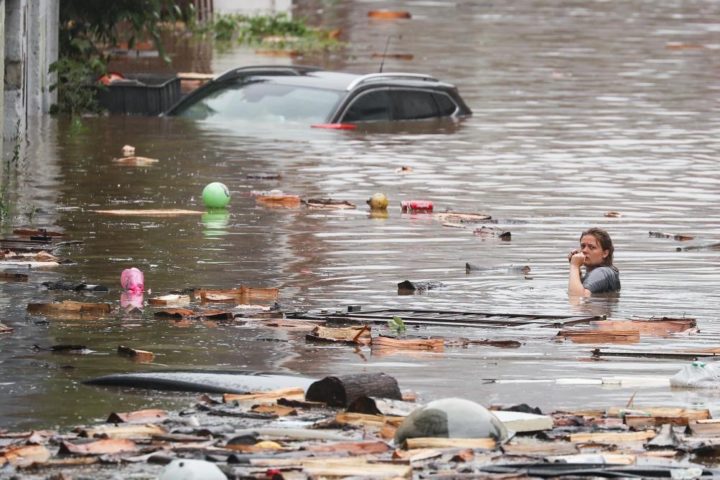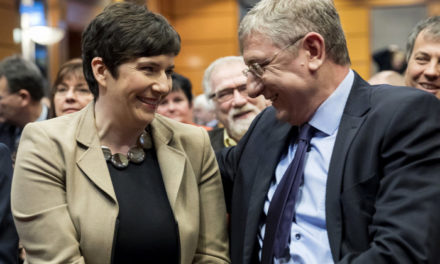More than three weeks have passed since huge floods devastated two German federal states. From the perspective of three weeks, it is now clearer what happened and why.
On the night of July 15, the flood inundated several narrow valleys of North Rhine-Westphalia and Rhineland-Palatinate in a matter of seconds, literally sweeping away some settlements. During the night, as a result of a rare but not exceptional meteorological situation, 400 liters of rain fell per square meter in a short period of time. Although the material damage was not preventable in the short term, this is not true at all regarding the human victims, Neokohn in his article.
British hydrology professor Hannah Cloke, one of the initiators of the European flood warning system EFAS, made serious accusations against the German authorities just one day later, on July 16. Four days before the disaster, EFAS clearly drew attention to the impending danger and notified the responsible German authorities. However, they did not alert the residents of the affected settlements, neither the public media nor the local law enforcement agencies issued warnings, and the few sirens that still existed did not sound. The endangered settlements were not evacuated.
However, no one feels responsible for the failure to raise the alarm and evacuate. Interior Minister Horst Seehofer rejected all criticism, as did Armin Schuster, head of the German disaster management. They allegedly forwarded the alarm, did everything they had to, except for the failure of the local authorities. The biggest mystery, however, is why the huge German state television and radio, pocketing billions from taxpayers, did not alert the public to the impending danger. While they non-stop tease the audience with the impending climate death, the real dangers obviously do not arouse their interest. WDR, the state TV and radio broadcaster of North Rhine-Westphalia, and SWR, the state TV and radio broadcaster of Rhineland, did not consider it their duty to warn the population, despite the reports of the meteorological institute, and to this day do not see it as having made a mistake.
The situation is similar in the field of rescue operations. It took days for emergency services to finally arrive on the scene with heavy machinery. In the meantime, we saw great examples of public cooperation: craftsmen, mechanics, local construction contractors, and farmers rushed to the scene with power machines and tractors, helped clear the ruins and search for survivors. Chancellor Merkel called on the population to donate, Armin Laschet, the Prime Minister of North Rhine-Westphalia, the chancellor candidate of the Christian Democratic CDU, promised a ridiculous 200 million euros in aid, 400 million from the federal government's central funds. But let's illustrate the magnitudes: The German taxpayer provides around forty to fifty billion euros per year to care for the migrants who have immigrated to the country since 2015, but only alms are available to help flood victims.
There is another piquancy to the matter: in 2014, when the migration pressure was already high and the local governments could not bear the burden, the government decided to redirect the then 9 billion flood protection fund to care for the migrants. So far, unfortunately, it has not been possible to find out whether the funds in question have since been replenished and are now available. Apparently not.
While state aid is still awaited, the ideological classification of the situation has begun. In the meantime, only one interpretation is pouring out from the state and government-loyal media: The cause of the flood is not simply the weather, the dead are not the result of the authorities' irresponsibility, unpreparedness, and neglect of flood protection, but the cause of everything is global warming, the climate catastrophe. In other words, no one is responsible for anything, who cares about such petty matters when our responsibility has global dimensions. And if we win in the fight against the climate catastrophe, there will be no floods either.
Chancellor Merkel was the first to name the person responsible for the tragedy when she arrived in Bad Münstereifel, one of the severely affected towns, on July 20. The solution, he said, would be to reduce German carbon dioxide emissions even faster, and he promised that he would do everything possible to do so. He was not interested in the local requirements of flood protection, the construction of water catchments, the protection of floodplains, the organization of public alarms, or helping the victims - he served the Great Cause, saving the world.
However, the height of cynicism was when the state media began to spread the word that the volunteers rushing to help were right-wing radicals, neo-Nazis and other "dissidents", anti-vaccination and anti-mask activists.
THW, the president of technical disaster protection, spread the word that the population, incited by right-wing radicals, allegedly attacked THW workers. He could not support the slander with any evidence, even the police contradicted him. To this day, not a single video footage has emerged, not a single witness who could support the accusation, but the media loyal to the government continues to vilify the volunteer helpers. They have already reached such a point that not a single mayor dared to accept the monetary donation collected by the so-called dissidents to help the victims.
What are the lessons of the flood disaster?
Among the main topics of today's German politics, the prevention of the climate disaster ranks first, followed by the creation of gender equality and the fight against racism and right-wing thinking. Of course, all of this applies to the whole world, since everywhere in the world the same people are the main problem. The biggest obstacle to the unfolding of this struggle is the concrete person, with his small concrete problems. We cannot predict an extreme meteorological event, we cannot determine the level of the Ahr, Erft and Wupper rivers one day in advance, we only know exactly how high it will be from the prevailing temperature a hundred years from now, and accordingly we will shape it into Europe's (yet) most important industrial state his politics.
If this absurd and childish conceit had not led to the death of two hundred people and the destruction of countless existences, one could even laugh at it.
Finally, just one more piece of data to illustrate German priorities: There are more than 200 gender departments at German universities and colleges. There are 18 hydrology departments.
The full article HERE .
Photo: Flood situation on July 15 in Erfstadt, Germany Photo: EyePress via AFP












